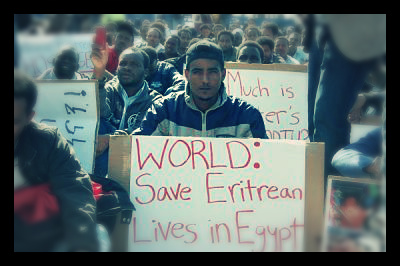Eritrean Refugees Abused in the Middle East

Refugees are fleeing Sub-Saharan Africa’s poverty in search for job opportunities, political freedoms and basic human rights. The sad reality of this situation is many of these opportunities are few and far in-between, and their lives rarely improve above the dire situation they were leaving.
Eritrea is one of the nations many have been fleeing from. Isayais Aferwerki, the despotic dictator who’s ruled Eritrea since its 1994 independence from Ethiopia, is a main reason. The nation is home to rampant poverty, media repression and political oppression. Adult-aged males are regularly conscripted into military service with no definite end-date, and the President was quoted as saying the nation was not ready for free elections for at least another 20-30 years. The constitution has been suspended and Eritrea remains single-party state, with opposition political groups regularly rounded up and jailed.
Around 200,000 Eritreans have left the nation in search of freedom, but it has resulted in a human rights crisis. Eritreans regularly flee to Sudan, Egypt and Israel only to be subjected to discrimination, and in some cases, have fallen into human trafficking. Israel has prevented refugees from entering by building a fence, which has resulted in asylum seekers slowing “to a trickle” of their original amount.
Human Rights Watch published a report detailing the crisis in early February stating that “refugees are commonly kidnapped, and their families extorted to pay for their release.” Those who manage to avoid kidnapping are usually deported back. HRW has focused on the culpability of Egyptian and Sudanese officials in the kidnapping crisis. The allegation has been made that corrupt officials have been benefiting financially from the situation and are actively cooperating with kidnappers.
Physicians for Human Rights released a damning report on the conditions many Eritrean refugees face on the trek to asylum. The imprisonment rate of those interviewed was around 59%, while 52% claimed they were violently abused at some point on their way to the Sinai Peninsula. Slave camps are prevalent in Egypt. In El-Arish, there are camps reported throughout the area, populated with “slave traders” who “demand ransoms” for the release of African refugees.
The report detailed that many of these refugees were tricked through “promises of being led to Israel” but rather held against their will, while other’s detailed “severe abuse.” Twenty percent of those interviewed also described witnessing murders. Israel can be considered culpable in this situation. With the building of the fence, the average of 1,500 refugees gaining asylum each month decreased to only 25 entering “between January and April 2013.”
Israel has also mounted a political campaign to defend their actions, decrying the Eritrean refugees as a “threat to Israeli society.” The public response to these accusations helped allow the government to enact stricter immigration legislation, allowing for slave traders to flourish in the wake.
The Anti-Infiltration Law was passed in January of 2012 by the Israeli Legislature of Knesset, and allowed the Israeli Government to detain any people found crossing the border. The law even prevents many of these refugees from receiving a speedy trail, allowing the Israeli state to detain undocumented immigrants for “minimum of three years.” If a undocumented immigrant is from a state considered belligerent to Israel, such as Sudan, they can be “detained indefinitely.”
It was a crushing defeat for many Africans in search of a new life free of oppression. With no options, many still flee, but they may not find the salvation they are in search of.
– Joseph Abay
Sources: Turkish Weekly, US State Department, Haaretz, The Voice, Sudan Tribune, DW, Physicians for Human Rights, Haaretz
